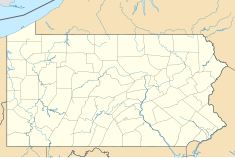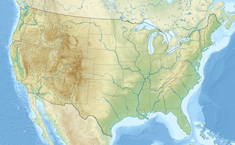Susquehanna Steam Electric Station
| Susquehanna Steam Electric Station | |
|---|---|
 |
|
| Country | United States |
| Location | Salem Township, Luzerne County, Pennsylvania |
| Coordinates | 41°5′20″N 76°8′56″W / 41.08889°N 76.14889°WCoordinates: 41°5′20″N 76°8′56″W / 41.08889°N 76.14889°W |
| Status | Operational |
| Commission date | Unit 1: November 12, 1982 Unit 2: June 27, 1984 |
| Owner(s) |
Talen Energy (90%) Allegheny Electric Cooperative (10%) |
| Nuclear power station | |
| Reactor type | BWR-4 |
| Reactor supplier | General Electric |
| Cooling source | Susquehanna River |
| Cooling towers | 2 |
| Power generation | |
| Units operational | 2 × 3952 MWth |
| Nameplate capacity | Unit 1: 1,350 MWe Unit 2: 1,350 MWe |
| Annual gross output | Unit 1: 9,456 GWh Unit 2: 8,781 GWh |
|
Website www |
|
The Susquehanna Steam Electric Station, a nuclear power station, is on the Susquehanna River in Salem Township, Luzerne County, Pennsylvania.
PPL operated the plant until June 2015 when Talen Energy was formed from PPL's competitive supply business. The plant has two General Electric boiling water reactors within a Mark II containment building on a site of 1,075 acres (435 ha), with 1,130 employees working on site and another 180 employees in Allentown, Pennsylvania. Harrisburg-based Allegheny Electric Cooperative purchased 10% of the plant in 1977.
Susquehanna produces 63 million kilowatt hours per day. It has been in operation since 1983. The prime builder was Bechtel Power Corporation of San Francisco, California. In the plant's first emergency, an electrical fire erupted at a switch box that controls the supply of cooling water to emergency systems. No injuries were reported following the 1982 incident.
Roughly 10,000 gallons of radioactive water spilled at the Station's Unit 1 turbine building after a gasket failed in the filtering system in 1985.
In November 2009, the Nuclear Regulatory Commission (NRC) extended the operation licenses of the reactors for an additional 20 years.
In 2008, PPL filed an application with the U.S. Nuclear Regulatory Commission for a license to build and operate a new nuclear plant under consideration near Berwick, Pennsylvania. The Bell Bend Nuclear Power Plant would be built near the company’s existing two-unit Susquehanna nuclear power plant. A decision by PPL on whether to move forward with the Bell Bend plant will not be made for several years.
The NRC defines two emergency planning zones around nuclear power plants: a plume exposure pathway zone with a radius of 10 miles (16 km), concerned primarily with exposure to, and inhalation of, airborne radioactive contamination, and an ingestion pathway zone of about 50 miles (80 km), concerned primarily with ingestion of food and liquid contaminated by radioactivity.
...
Wikipedia


